Green technologies on the rise: A dive into Berlin’s vibrant green tech startup ecosystem
A megatrend unfolds
What is green technology, or in short, green tech? In a nutshell, it’s a technology that reduces negative human impacts on the environment. For Berlin-based Greentech Alliance, green tech businesses are founded to serve an environmental purpose. These businesses use science-based technologies, ideas, and methodologies to find solutions for global challenges, such as global warming, pollution, and biodiversity loss.
At Impact Hub Berlin, green tech startups from all over the world can find their home. We’ve dedicated one of our four ecosystems to green tech as well as our next Impact Incubator, which will run early next year. We’re building a collaborative community of tech innovators every day, ensuring they receive access to everything they need, to foster entrepreneurial action. With access to maker spaces and labs, green tech startups at Impact Hub Berlin can research, develop, and prototype their ideas. With networking and matchmaking with varied stakeholders in the ecosystem, they can make the right connections to effectively scale.
Read on to learn more about the innovators in Impact Hub Berlin’s green tech ecosystem and how you too can get involved with your green tech company! Are you passionate about this field, have entrepreneurial ideas, or have an early-stage startup? Applications for our brand-new climate tech incubator have just opened. Check out the end of this blog for more information!

Drivers of green tech: The biggest trends
Impact startups building their businesses around green tech ideas are creating and innovating across many industries, from energy, to agriculture, to atmospheric science, to hydrology and material science. Even though it’s gaining popularity, the rise of green tech is not a new development. For example, in the first half of the 20th century, new technologies have already been developed to treat wastewater using biotechnology. Nowadays, green tech startups provide cutting-edge solutions across several industrial sectors – many of them at Impact Hub Berlin!
Here are some examples of green technologies across different sectors that are helping to change our world into a more sustainable one, plus some of the startups from Impact Hub Berlin’s green tech ecosystem that are innovating in these respective fields.
The energy sector
- Renewable Energy: Solar, wind, and wave energy, help humanity get their ever-growing energy demand from a less carbon-intensive technology, such as burning fossil fuels.
- Smart Grids: Implementation of smart grids for more efficient energy distribution and consumption.
At the Impact Hub Berlin, STABL and phelas are unlocking an affordable and sustainable energy supply via energy storage modules. With their technologies, they’re working on a key measure to “achieve flexibility, enhance grid reliability and power quality, and accommodate the scale-up of renewable energy”, according to World Bank. Both startups help their clients gain more independence from conventional grids.
The agricultural and forestry sector
- Vertical farming: Uses less resources, such as land and water, and can be set up in an urban environment.
- AgTech Solutions: Adoption of precision agriculture technologies, including sensors, drones, and data analytics to optimise farming practices, reduce resource use, and enhance crop yields.
Two startups from our IHB community operating in this sector are ororaTech and Skyseed. ororaTech offers wildfire detection and monitoring technologies, enabling fast and safe reactions to environmental hazards. With their technology, ororaTech contributes to the effective protection of forests by employing satellites, infrared cameras and AI-based algorithms for the detection of wildfires.
Skyseed has developed a fast and efficient reforestation technology with drones that sow pelleted seeds from the air. Combining knowledge of healthy forest ecosystems with high tech, Skyseed has created a much-needed solution for practical reforestation.
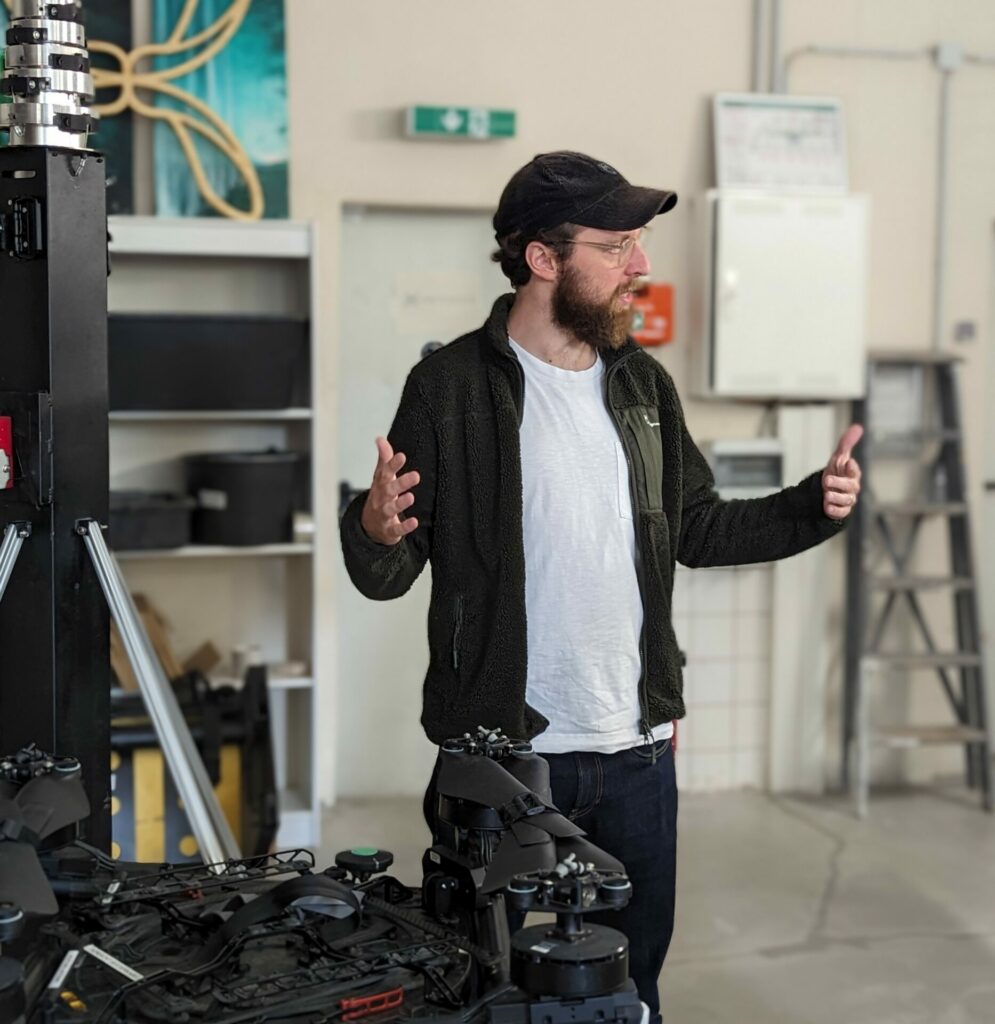
The circular economy sector
While the circular economy is not really a sector but rather a new economic paradigm that aims to fundamentally change the way resources are used, there is a significant overlap between the circular economy and green tech. While not all green tech solutions are circular and not all circular business models rely on high-tech, exciting innovations are happening at this intersection and also here at Impact Hub Berlin!
- Carbon capture and storage: Advancements in technologies to capture and store carbon emissions from industrial processes and power generation.
- Recycling and biodegradability: The development of biodegradable and compostable materials that don’t require energy-intensive recycling processes.
New Dawn Silicone is part of our circular economy ecosystem at Impact Hub Berlin and has developed a chemical recycling process through which they can recover silicone. Their innovative process allows for the use of end-of-life silicones instead of new silicones, saving energy and resources and thus contributing to a circular economy. Furthermore, the female-founded startup has been nominated for the Innovationspreis Berlin Brandenburg 2023 and successfully completed Impact Hub Berlin’s Circular Together incubator.
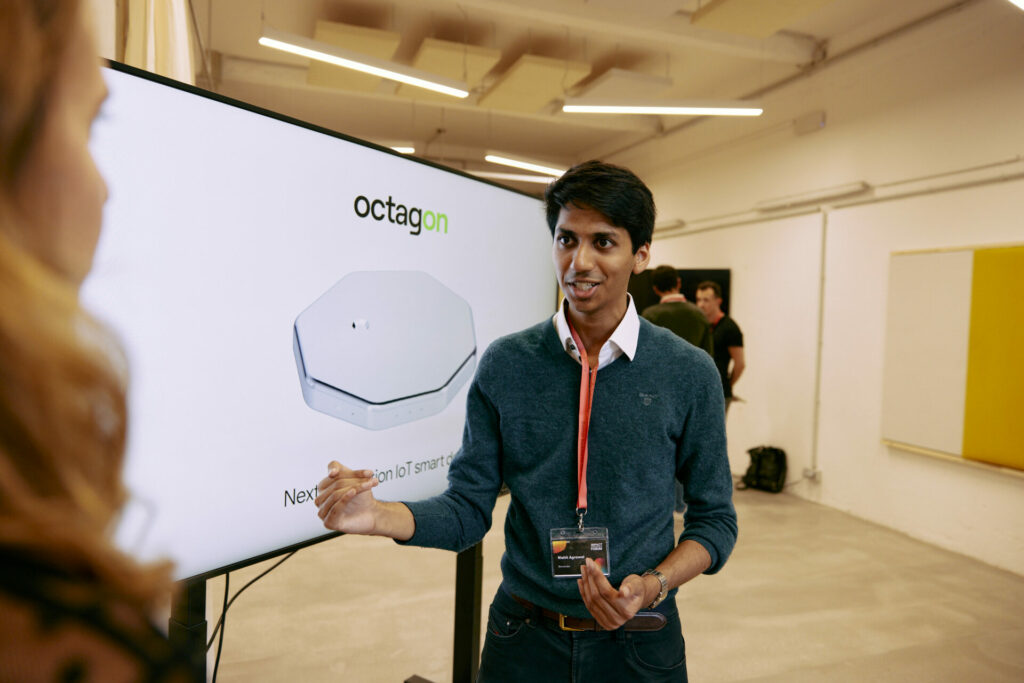
The information and software sector
- Carbon accounting & Carbon credits: Software that measures the carbon dioxide emissions or permits and projects that can be bought to emit a certain amount of carbon dioxide.
- Artificial Intelligence & Internet of Things: Smart Software and devices utilizing AI to cut emissions and other climate-negative impacts of companies or processes.
Two Berlin-based green tech startups active in the information and software sector which are members of our community are Numcamp and Skonelabs.
Numcamp developed a collaborative, intelligent cloud-based software solution for climate and energy professionals from the manufacturing industry, helping to track and reduce carbon emissions.
Skonelabs are on a mission to monitor food quality and prevent food loss at an industrial scale. They offer a smart sensor device and a dynamic AI engine to predict quality change and estimate spoilage in advance. Skonelabs have been a very active part of our community as the’ve participated in Impact Hub Berlin’s incubation programme for Circular Economy startups and also in our 6-week ImpAct Accelerator funded through the REACT with Impact funding programme of the European Union, in collaboration with the Federal Ministry for Economic Affairs and Climate Action. The funding supports impact oriented enterprises working on ecological and social innovations addressing the most pressing challenges of our time. Sounds familiar? Exactly luckily the mission of Impact Hub Berlin and of REACT with Impact programme could not be closer aligned.
Berlin: A hotspot for green tech
We couldn’t be happier about the innovation ecosystems that are formed by our community at Impact Hub Berlin, and about our location in the capital of green tech developments in Germany: Berlin! Centered in the heart of Europe, the city offers countless opportunities for green tech startups and scaleups that want to expand their impact across Germany and Europe. Berlin tech startups both inside and outside of Impact Hub Berlin’s community are developing cutting-edge technology, ranging from energy-efficient tech to waste-reduction initiatives. They benefit from a vibrant and supportive business environment, with access to funding, academic research, and a culture that encourages experimentation and collaboration. With a strong commitment to sustainability and a culture that embraces technological advancements, Berlin’s Senate Department for economic affairs, energy and public enterprises plays a pivotal role in shaping the future of environmentally conscious technology. Recently, the Berliner Startup Stipendium, a funding program for early-stage startups, has been granted to Impact Hub Berlin (along with other incubator builders like WISTA). In facilitating the Berlin Startup Stipendium the fourth year we remain the city’s trusted partner in support of the development of entrepreneurial ideas and climate tech in Berlin. The Senate’s mandate has enabled us to create the Climate Tech Incubator 2024 programme and guarantees the participants financial support in the form of a monthly stipend. The applications to the programme are open till the end of January.
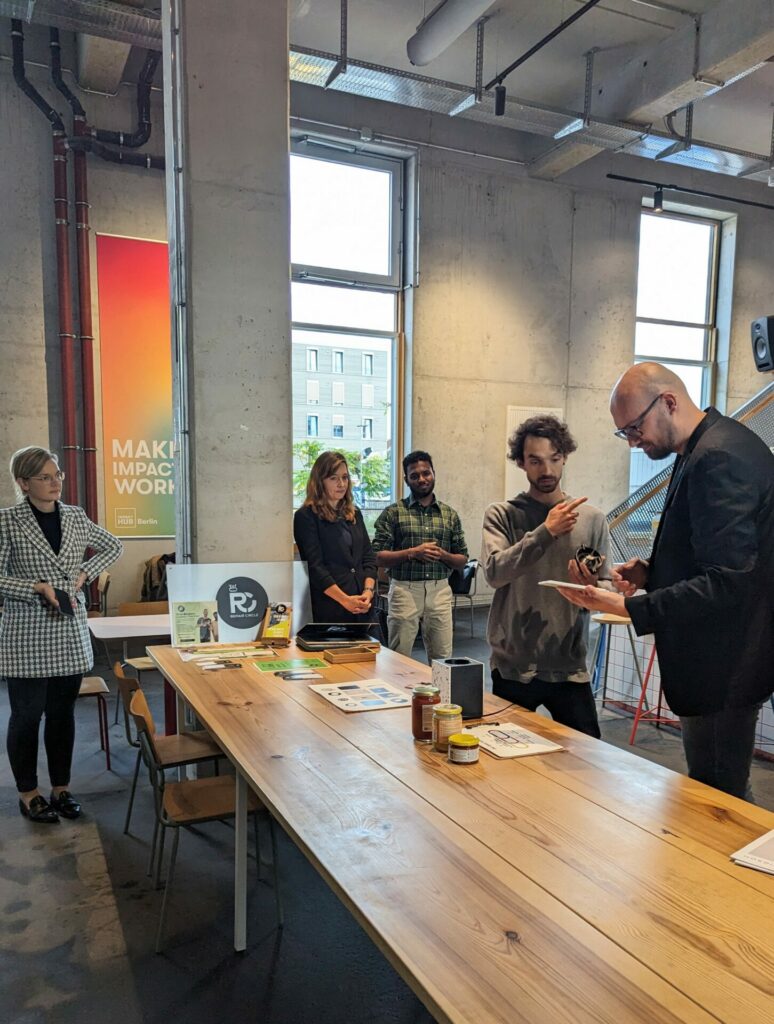
Impact Hub Berlin also implemented the Berlin Landing Pad programme together with enpact e.V. and Bosch Startup Harbour. The programme supported green tech startups from Latin America, Asia, Africa and Eastern Europe to connect with the buzzing Berlin ecosystem and equip them with the skills to expand their business and impact to the German and European markets. The focus was on market entry and business set-up, alongside creating connections with potential partners, investors, and customers within the Berlin startup ecosystem.
The Senate’s incredible drive to foster green tech and climate critical innovations has meant it also funds the nawi.berlin project, which aims to provide support and navigation for Berlin businesses on their green transformation journey. Alongside the Bundesverband nachhaltige Wirtschaft BNW e.V. and the Social Entrepreneurship Network Germany, Impact Hub Berlin is working as the third consortium partner to bring this vision to life by providing access to our impact community and coworking space. Our role in the programme is to provide a selected group of Berlin Impact startups with 30 workspaces in our coworking hub and welcome them in the community and network. Among the innovative startups that joined Impact Hub Berlin through nawi.berlin is green tech rising star Crowd Impact - an app helping the event industry to understand and minimise the CO2 footprint related to its visitor traffic.
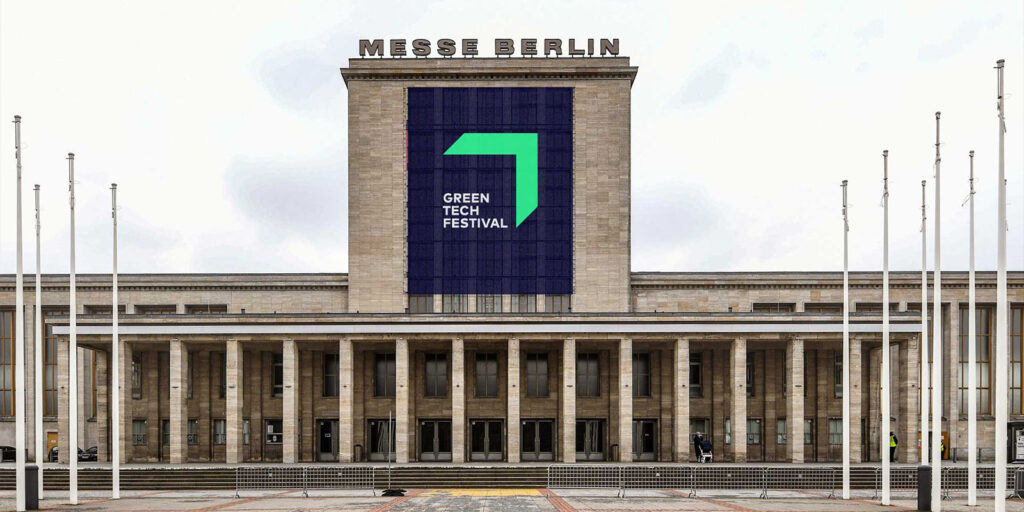
Further, Berlin is home to the Greentech Festival, a key conference and trade show of green technologies, bringing together peers from the industry and pushing Green Tech into the mainstream like no other event. At Greentech Festival 2023, Impact Hub Berlin proudly took over the stage of the urban innovation hub together with five impact tech startups that grew through our circular economy incubator Circular Together, a programme which was also supported by the Berlin Senate.
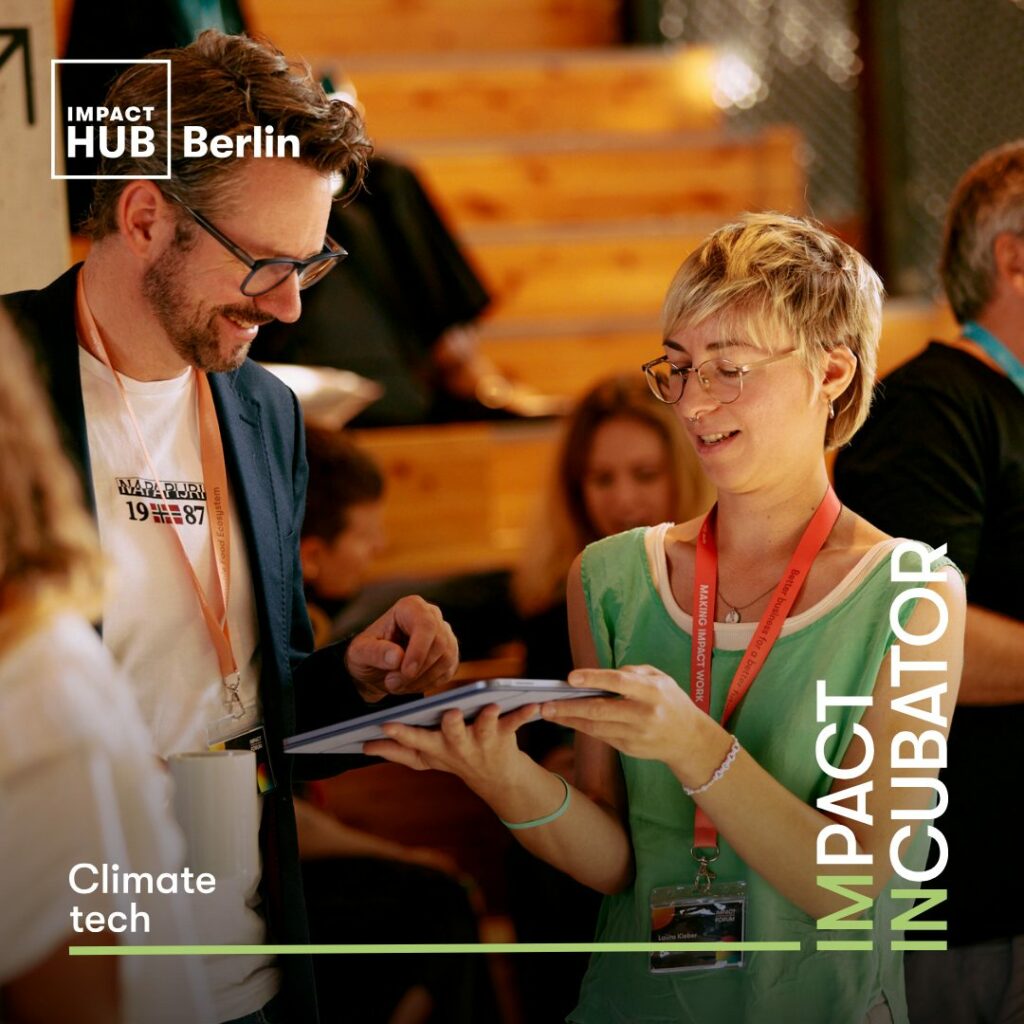
Berlin offers countless events, conferences, and meetups that bring together innovators, developers, and entrepreneurs from the green tech scene, with many meeting at events and activities run by Impact Hub Berlin’s Green Tech Ecosystem. One such event was the Masterplan Industriestadt Berlin Conference, which took place at Impact Hub Berlin in November, as part of Berlin’s plan to transition the city’s industrial sector to the Circular Economy. It was a pleasure to present our community and work as one of the key players advancing the city's circular ambitions. If you want to stay up to date on our future activities - keep an eye on our upcoming events!
Accelerate your green tech journey at Impact Hub Berlin
As a multicultural and English-speaking community settled in Berlin, we provide the perfect environment for green tech startups from around the world that are looking to expand their business in Europe. In early 2024, Impact Hub Berlin will run a new impact incubator for green tech and climate tech startups. Are you ready to come to Berlin and take the next step with your startup in the heart of Europe? Then apply for our Climate Tech impact incubator programme!
If you want to join our community of entrepreneurs and changemakers at Impact Hub Berlin, reach out to us or apply here directly. We’re looking forward to collaborating and innovating together with you!
Das Projekt Impact Incubator: Climate Tech wird gefördert aus Mitteln der Europäischen Union und des Landes Berlin im Rahmen des Europäischen Sozialfonds.